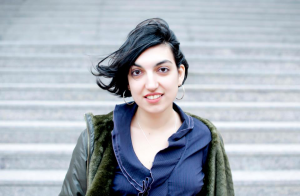
More than 500 authors (including Martin Amis, Margaret Atwood, Don DeLillo, and Ian McEwan) have signed a petition for the UN demanding an end to government and corporate surveillance of individuals online.
n+1 just published No Regrets: Three Discussions, a collection of conversations about the perils and joys of reading while female, featuring Elif Batuman, Astra Taylor, Emily Witt, Sara Marcus, and many more. Editor Dayna Tortorici writes, “I knew that women speak to one another differently in rooms without men. Not better, not more honestly, not more or less intelligently—just differently, and in a way one doesn’t see portrayed as often as one might like.”
The Capital New York staff speculates that New York Times editor Jill Abramson will announce the replacement of NYT Magazine editor Hugo Lindgren “in the next several days.” Michael Wolff explains how the Times’s fashion magazine, T, “sucked up all the richest advertising pages from the Magazine.” Wolff adds: “T looks like a modern magazine. … The Times Magazine, although it has tried to add modern details, still seems old fashioned.”
In New York magazine’s year-end profile of Rachel Kushner, Boris Kachka trails the novelist through the Christopher Wool show at the Guggenheim and to the National Book Award ceremony; talks to friends, family, and colleagues; and traces her development as a writer from her childhood until today: “Writing is a way of living,” Kushner says. “It doesn’t quite matter that there are too many books for the number of readers in the world to read them. It’s a way of being alive, for the writer.”
President Obama delivered one of the emotional knockouts of Nelson Mandela’s memorial service in Johannesburg yesterday when he quoted the late South African leader’s most famous speech, from the Rivonia Trial in 1964: “I have fought against white domination and I have fought against black domination. I’ve cherished the ideal of a democratic and free society in which all persons live together in harmony and with equal opportunities. It is an ideal which I hope to live for and to achieve. But if needs be, it is an ideal for which I am prepared to die.”
The Guardian, meanwhile, considered Mandela’s literary legacy from a different direction, looking at how he inspired generations of South African writers—including Nadine Gordimer, J M Coetzee, Lauren Beukes, Amchat Dangor, André Brink, Breyten Breytenbach, Njabulo Ndebele, and Thomas Mofolo—to confront not only the conditions of apartheid but also the persistence of social inequities that continue to this day.
Ursula Lindsey, writing for Egypt’s Mada Masr, weighs in on two new books about political upheaval and urban change in the megacity that is Cairo.